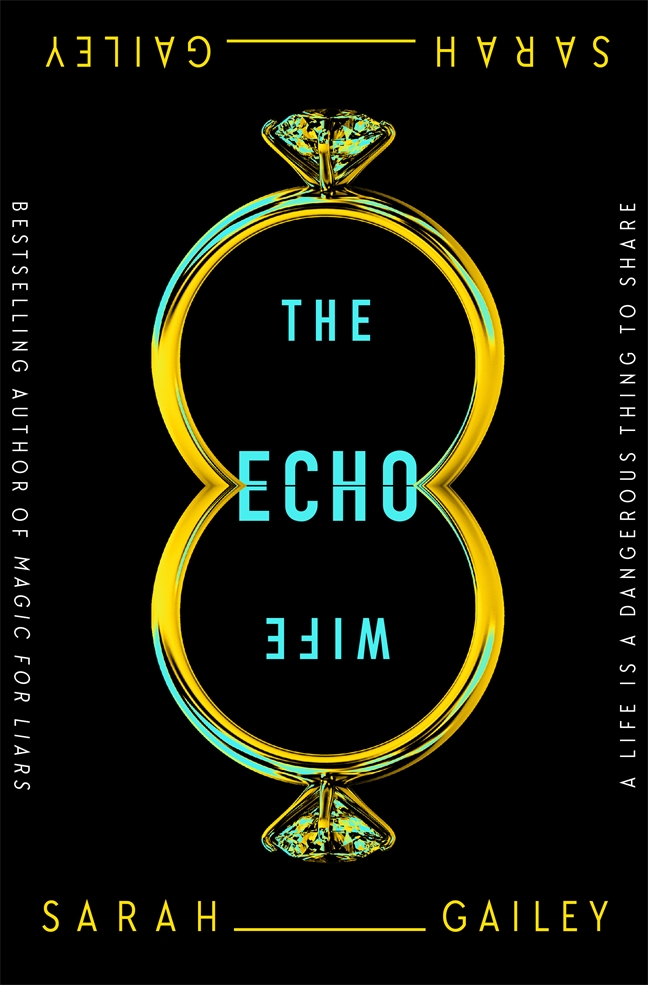
Review by Jason Heler:
The Echo Wife’ Layers Sci-Fi And Murder Mystery For A Twisty Treat
Sarah Gailey knows how to build the heck out of a world. In two of their recent books — 2019’s Magic for Liars and 2000’s Upright Women Wanted — the author created a school of wizardry and a dystopian Wild West, respectively, that enticed lovers of these fantasy/science-fiction tropes while yanking them both on their ear. I was enchanted by both, and I went into Gailey’s new novel, The Echo Wife, with a big expectation for yet another immersive, wonderfully detailed, fictional setting. I was not catered to. There isn’t any real world-building in The Echo Wife because, well, there’s no world to build. It already exists. It’s our own. The book takes place, more or less, in the here and now, and even the rich concept behind its science-fictional premise — namely cloning — keeps a fuzzy distance. Once I got over my initial bout of pouting, though, I gave myself over to Gailey’s latest exercise in character-driven speculation. And I was happy I did.
Gailey is an ace at constructing clean, clear plots, and The Echo Wife is no exception. The concept behind it is bracingly simple: Evelyn Caldwell is a famed genetic researcher, and she shares a tense, complicated relationship with her husband Nathan. As it turns out, Nathan has used Evelyn’s scientific breakthrough — the Caldwell Method — to clone Evelyn herself. Martine is this replica’s name, and she does more than resemble Evelyn physically; she’s actually become Nathan’s lover. When Nathan announces that he’s going to leave Evelyn in favor of the pliant, submissive Martine, the cracks in their marriage blow open. But that’s nothing compared to the next shocker: Nathan winds up murdered, which leads Evelyn and Martine — sisters in their own way — to uncover the secrets in their lives. They then must decide how they’re going to move forward as individuals. Or something more than individuals. Or something less.
Of course, Gailey is far from the first author of speculative fiction to start out crafting strange, far-flung worlds before deciding to narrow their scope and explore the nuances of our current reality. Ursula K. Le Guin made that lateral move, and so did Kurt Vonnegut. That’s not to say Gailey resembles either of those legends; their voice has a clarity and resonance — and pace — all its own. The Echo Wife is a thriller at heart, but it takes its time, building suspense gradually and allowing the cumulative mass of deceptions and consequences begin to weigh on Evelyn and Martine — and even the departed Nathan, who might as well be an omnipresent specter who continues to pressure his two survivors from beyond the grave.
Normally I try to steer clear of comparing books to TV shows — apples and oranges and all that — but with The Echo Wife, it’s unavoidable. And that’s a good thing. In the book’s treatment of cloning, gender dynamics, moral ambiguity, and the lofty idea of the existential nature of identity, it has a passing resemblance to some great contemporary television, including Killing Eve, Orphan Black, Black Mirror, and Westworld (specifically, the current small-screen incarnation of Westworld rather than the classic movie — or even the Michael Crichton novel it was based on). And in fact, Gailey once said in an interview, “This might sound silly, but my writing is heavily influenced by television. I pay close attention to the way TV writers structure narrative beats, plot development, and character arcs.” In The Echo Wife, it shows. From the snap of its dialogue to the torque of its twists, the story positively glows.
Cooked right, science fiction and murder mysteries taste great together, and Gailey layers those ingredients together with a chef’s kiss. The technology behind cloning isn’t deeply detailed because, honestly, the book doesn’t need it. At the same time, the sharp left hooks of the plot are only possible because of the sci-fi power behind them. From a dark place within both Evelyn and Martine, some eerie questions pop up: If lies are sometimes justifiable, where does one draw the line? Do we possess true individuality, or are we just clumps of quirks that we’ve absorbed from the people around us?
“If you are loved, then you cannot be replaced,” Evelyn muses at one point, thinking back across the trail of horror, deceit, and hypocritical platitudes that Nathan, in all his manipulative smugness, winds up leaving in his wake. Their almost-future love triangle becomes an alternative universe; in it, the possibilities for heartbreak are endless. There are no magic wands or post-apocalyptic cults in The Echo Wife, but Gailey nonetheless builds one of their most daring worlds yet — the massive, internal world that forms between two people linked by secrets, lies, hatred, and love. Not to mention that shared, unsettling epiphany of seeing their rawest selves reflected in each other.
